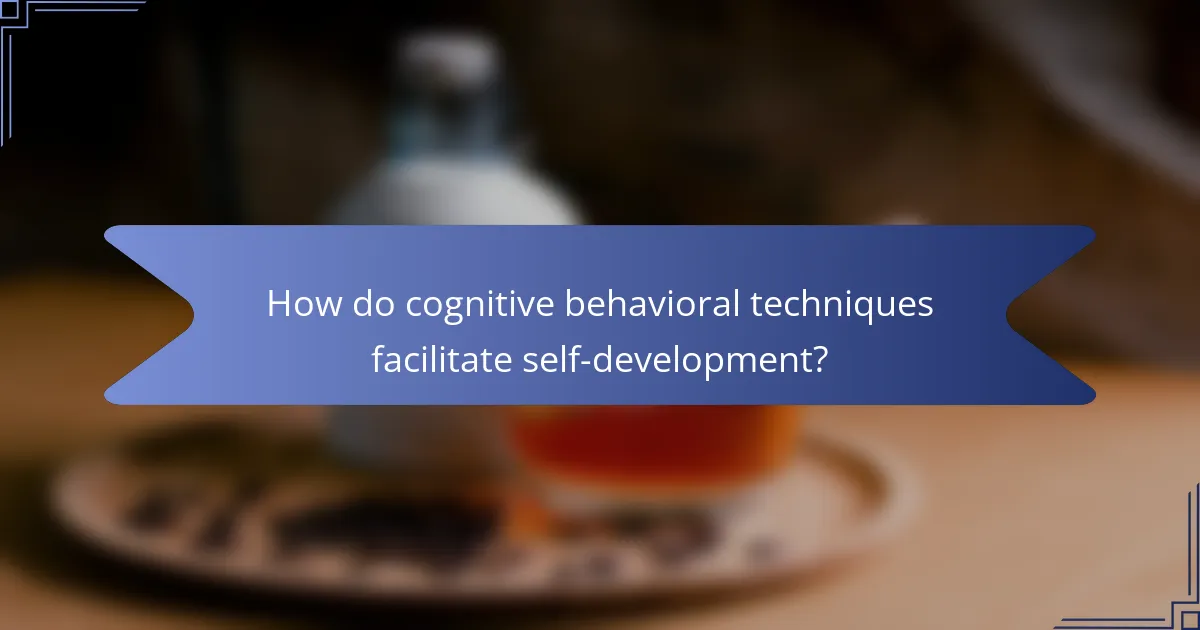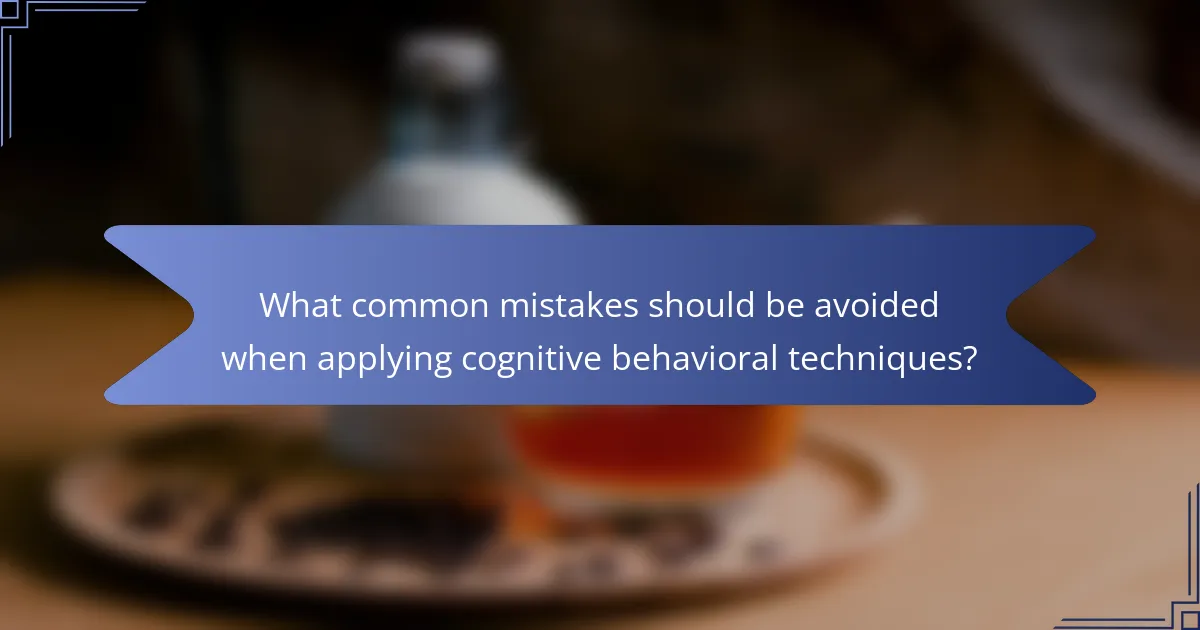Self-development can be significantly enhanced through psychological insights, particularly by using cognitive behavioral techniques. These methods promote awareness of thought patterns, encourage engagement in meaningful activities, and facilitate effective goal setting. By focusing on cognitive restructuring and behavioral activation, individuals can achieve lasting change and improved emotional regulation. Understanding common pitfalls can further optimize the application of these techniques for personal growth.

How do cognitive behavioral techniques facilitate self-development?
Cognitive behavioral techniques facilitate self-development by promoting awareness of thought patterns and behaviors. These techniques encourage individuals to identify and challenge negative beliefs, leading to transformative change.
Cognitive restructuring is a core method that helps replace unhelpful thoughts with constructive ones. This process enhances emotional regulation, fostering resilience and personal growth.
Behavioral activation, another key technique, encourages engagement in meaningful activities. Increased participation in positive experiences boosts motivation and reinforces self-efficacy, essential for lasting self-improvement.
Goal setting within cognitive behavioral frameworks allows for measurable progress. By establishing clear, achievable objectives, individuals can track their development and maintain focus on personal growth.
What are the foundational principles of cognitive behavioral therapy?
Cognitive behavioral therapy (CBT) is founded on principles that emphasize the connection between thoughts, feelings, and behaviors. These principles include cognitive restructuring, which involves identifying and challenging negative thought patterns, and behavioral activation, which encourages engagement in activities that promote positive emotions. CBT is structured, goal-oriented, and typically short-term, focusing on equipping individuals with practical skills to manage their mental health. The approach is evidence-based, with numerous studies supporting its effectiveness in treating various psychological issues.
How does cognitive restructuring enhance personal growth?
Cognitive restructuring enhances personal growth by altering negative thought patterns. This technique promotes self-awareness, leading to healthier perspectives and behaviors. It empowers individuals to challenge limiting beliefs, fostering resilience and adaptability. As a result, personal growth becomes more attainable through improved emotional regulation and decision-making skills.
What steps are involved in cognitive restructuring?
Cognitive restructuring involves several key steps to challenge and change negative thought patterns. First, identify distressing thoughts and their triggers. Next, evaluate the validity of these thoughts by examining evidence for and against them. Then, replace negative thoughts with more balanced, rational alternatives. Finally, practice these new thought patterns regularly to reinforce positive change.
What role does self-awareness play in effective self-development?
Self-awareness is crucial for effective self-development as it enables individuals to identify their strengths and weaknesses. This insight fosters personal growth by guiding the application of cognitive behavioral techniques. By recognizing patterns in thoughts and behaviors, individuals can implement lasting change and enhance their overall well-being.

What are the universal benefits of cognitive behavioral techniques?
Cognitive behavioral techniques provide universal benefits such as improved emotional regulation, enhanced problem-solving skills, and increased resilience. These techniques foster self-awareness, enabling individuals to identify and challenge negative thought patterns. As a result, practitioners experience greater life satisfaction and reduced anxiety levels. Additionally, cognitive behavioral techniques support lasting behavioral change by promoting adaptive coping strategies.
How can these techniques improve emotional regulation?
Cognitive behavioral techniques enhance emotional regulation by promoting awareness and restructuring negative thought patterns. These methods encourage individuals to identify triggers and develop coping strategies, leading to improved emotional responses. For example, cognitive reframing helps shift perspectives, reducing anxiety and enhancing resilience. Regular practice of these techniques fosters lasting change in emotional management.
What impact do cognitive behavioral techniques have on goal setting?
Cognitive behavioral techniques significantly enhance goal setting by fostering clear, actionable steps. These techniques promote self-awareness, enabling individuals to identify obstacles and reframe negative thoughts. As a result, they increase motivation and accountability, leading to more effective goal achievement. Research shows that structured approaches, such as SMART goals, are particularly effective when combined with cognitive behavioral strategies. This integration improves focus, resilience, and overall success in personal development initiatives.
How do they foster resilience in the face of challenges?
Individuals foster resilience by employing cognitive behavioral techniques that promote adaptive thinking and emotional regulation. These strategies help in reframing negative thoughts and enhancing problem-solving skills. For example, practicing mindfulness can reduce stress and improve focus during challenges. As a result, individuals develop a stronger capacity to cope with adversity and maintain a positive outlook.

What unique attributes distinguish cognitive behavioral techniques?
Cognitive behavioral techniques are distinguished by their focus on changing thought patterns, practical application, and evidence-based results. These techniques uniquely integrate cognitive restructuring, which targets negative beliefs, with behavioral activation, promoting engagement in activities that enhance mood. This dual approach facilitates lasting change by addressing both cognition and behavior simultaneously. Additionally, cognitive behavioral techniques emphasize skill development, enabling individuals to manage their thoughts and emotions effectively over time.
How do personalized approaches enhance the effectiveness of these techniques?
Personalized approaches significantly enhance the effectiveness of cognitive behavioral techniques by tailoring interventions to individual needs. This customization leads to higher engagement and better outcomes. For instance, assessing personal triggers allows for targeted strategies, increasing the likelihood of lasting change. Research indicates that individuals who receive personalized therapy report greater satisfaction and improved mental health metrics compared to those in standardized programs. Ultimately, personalized methods foster a deeper connection to the self-development process, promoting sustained behavioral shifts.
What is the significance of integrating mindfulness with cognitive behavioral methods?
Integrating mindfulness with cognitive behavioral methods enhances emotional regulation and self-awareness. This combination fosters resilience against stress and promotes lasting behavioral change. Mindfulness cultivates present-moment awareness, allowing individuals to recognize and alter negative thought patterns effectively. Research shows that this integration can lead to improved mental health outcomes, including reduced anxiety and depression levels. By combining these techniques, individuals gain tools for better coping strategies and a deeper understanding of their cognitive processes.

What rare attributes can enhance the application of cognitive behavioral techniques?
Rare attributes that can enhance cognitive behavioral techniques include personalized feedback, real-time emotional tracking, cultural adaptability, gamification elements, and integration with biofeedback devices. These unique attributes facilitate deeper engagement and tailored experiences, leading to more effective self-development outcomes.
How can cultural considerations influence the effectiveness of these techniques?
Cultural considerations significantly influence the effectiveness of cognitive behavioral techniques in self-development. Techniques must align with cultural values and norms to resonate with individuals. For example, collectivist cultures may prioritize community support, impacting how techniques are applied. Additionally, cultural beliefs about mental health can affect openness to psychological insights. Understanding these variations enhances the relevance and acceptance of self-development strategies across diverse populations.
What innovative practices are emerging in cognitive behavioral therapy?
Innovative practices in cognitive behavioral therapy (CBT) focus on integrating technology and personalized approaches. Techniques such as virtual reality exposure therapy enhance traditional methods by providing immersive experiences. Additionally, the use of mobile applications allows for real-time tracking of thoughts and behaviors, promoting self-awareness. Another emerging practice includes the incorporation of mindfulness strategies within CBT, fostering emotional regulation. These advancements aim to improve client engagement and treatment effectiveness.

What common mistakes should be avoided when applying cognitive behavioral techniques?
To effectively apply cognitive behavioral techniques, avoid common mistakes that can hinder progress. Key mistakes include neglecting self-awareness, failing to set specific goals, and not tracking progress. Additionally, overlooking cognitive distortions and resisting emotional discomfort can undermine the effectiveness of these techniques. Engaging with a professional can help navigate these challenges.
How can one effectively measure progress in self-development?
To effectively measure progress in self-development, utilize concrete metrics and self-reflection. Set specific goals and track achievements regularly.
1. Define clear, measurable objectives.
2. Use journals to document thoughts and feelings.
3. Implement feedback loops for continuous improvement.
4. Assess skills and knowledge through self-assessments.
5. Reflect on behavioral changes over time.
6. Adjust strategies based on progress evaluations.
What are the best practices for sustaining change through cognitive behavioral techniques?
To sustain change through cognitive behavioral techniques, practice consistency, set specific goals, and monitor progress. Engaging in regular self-reflection enhances awareness and reinforces positive behaviors. Utilizing cognitive restructuring helps challenge negative thought patterns, fostering resilience and adaptability. Incorporating social support increases motivation and accountability, making the change more sustainable.